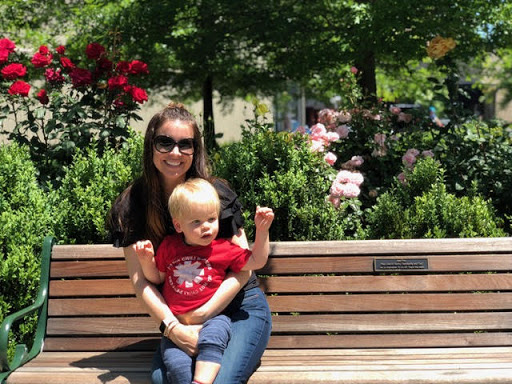
in Living Hope, Stories of Hope
In our Stories of Hope series, we connect with everyday individuals to learn more about what Hope means to them, how they’ve overcome challenges and obstacles and the ways in which they practice Hope in their daily lives. We share these stories in the hopes that someone, somewhere, might be inspired by and encouraged to pursue and practice Hope in their own life. Because no one should live in despair and hopelessness. Not even you. Read the latest from of Stories of Hope series below.
1. Tell us a little about yourself.
My name is Becky Vieira, and I am 42 years-old. I live in San Francisco with my husband and our 22 month-old son. I worked as a publicist up until I became pregnant with my son. I’m now a stay-at-home mom and writer.
2. What life challenges have you faced, and how have you been able to overcome?
After the birth of my son, I was diagnosed with postpartum depression (PPD). I was in a fog, unable to truly enjoy my baby and new motherhood. I was convinced my husband and son would be better off without me, and often thought about running away. I’m a mom blogger, and I share much of my life with my readers. I was very transparent with my situation, and attracted a group of mom shamers who came after me. The height of my PPD dovetailed with the immense online bullying I received via Instagram, and it was almost too much to bear. I considered suicide because I saw no other way to end the pain I was feeling. I went as far as planning how I would take my life. Luckily, I had the support of friends and family who recognized how bad my depression had become and intervened.
3. What is your definition of Hope?
To me, Hope means believing in the intangible. You can’t see it or feel it. At times it even seems as if there’s no sign of its existence. But you have to hold on, trusting that something better is ahead. I couldn’t see a way out of my misery. It felt never-ending, that I’d spend the rest of my life in pain. Yet, I refused to let go. Buoyed by the support of family and friends I was able to hold on and trust that things would get better for me.
4. How has having Hope impacted your life, and how do you continually practice it?
It helps me endure tough times.
When things feel overwhelming I try to remember what I endured. That if I can get through that, I can handle anything.
It’s also helped me to become a better mother. Having a more positive and hopeful attitude is a trait I hope to teach my son.
Holding on to Hope enabled me to believe what everyone around me was saying—that my postpartum depression was not my fault. Accepting those words helped me to heal.
5. How has finding Hope changed the way you view rejection, setbacks or difficulties?
Nothing gets me down as much as it did before. I know things can get better, I have hope and I believe in it. Whereas before PPD, I’d have stress and anxiety, now I’m much more calm. That doesn’t mean I sit still and let things happen. I picture myself as more of a duck now. Gliding calmly on the surface, while doing the work underwater. I still have stressful moments, yet it feels less frantic outwardly, which helps me stay relaxed and not get as worked up. It’s a more zen approach to life.
6. What have you learned about yourself along your journey?
I’ve learned that I am so much stronger than I ever knew, or gave myself credit for. My self confidence has grown and I don’t pay as much attention to what others think.
I know who I am and what I’m capable of doing.
7. What advice would you like to give to those who are feeling Hopeless?
A friend said it perfectly to me when I was in the depths of my PPD: “You will not be around to feel the relief you think death will give you.” It’s a permanent attempt to solve what is most likely a fleeting problem. To any moms with PPD, please know you’re not alone, this isn’t your fault and it will pass.
8. Do you have any other words of wisdom you would like to add?
Use your voice—even if all that’s left if a whisper—to speak out. Talk to your friends, family, a doctor. There are good people in this world who want to help you feel better.
Becky Vieira lives in San Francisco, Calif. with her husband and toddler son. After working as a publicist for nearly two decades, she left her job to be a stay-at-home-mom to her firstborn at the age of 41. Shortly after the birth of her son, Becky was diagnosed with postpartum depression, and began sharing her story in hopes of helping other moms. She’s a contributing writer for BabyCenter.com, and chronicles her motherhood journey on Instagram.
Connect with Becky Vieira
Website: thewittyotter.com
Blog: babycenter.com/expert-becky-vieira
Instagram: @WittyOtter
